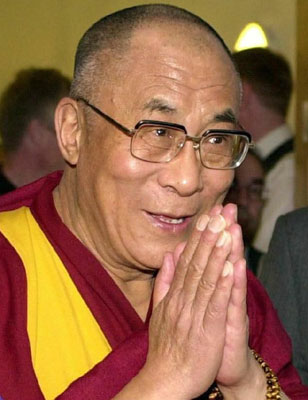
The Dalai Lama
By Kate Brumback
The Associated Press
ATLANTA (AP) — Scientists and religious practitioners can learn a lot from each other and should work together to find a productive balance between spirituality and secular research, the Dalai Lama said Sunday.
The exiled Tibetan spiritual leader’s comments came at a news conference kicking off his three-day visit to Emory University in Atlanta. During his visit, he would teach, lecture, and receive an update on the development of the Emory-Tibet Science Initiative.
The Dalai Lama is a presidential distinguished professor at Emory — the only university appointment he has accepted. The 1989 Nobel Peace Laureate last visited Emory’s campus three years ago.
It is especially important that scientists have “moral ethics” and compassion to avoid catastrophes, he said, citing the example of nuclear physics being used to create the nuclear bombs that were dropped on Japan at the end of World War II.
“That great achievement became destructive, brought fear,” he said. “Intelligence alone is dangerous.”
The Dalai Lama said he has long been interested in scientific knowledge — particularly in the areas of cosmology, neurobiology, physics, and psychology, which he says are mentioned in Buddhist texts.
In the beginning, some of his followers were skeptical of the Emory-Tibet Science Initiative, a partnership that seeks to establish a science curriculum to be included in the regular monastic education for monks and nuns throughout India. But now that it is in the third year of a five-year pilot program, it is widely accepted, and there is great appreciation for scientific explanations, he said.
Faculty and students from Emory travel each year to Dharamsala, India, the seat of the Tibetan government in exile, to work with monks and nuns. As a presidential distinguished professor at Emory, the Dalai Lama provides private teaching sessions with students and faculty who travel to visit him in India as part of a study abroad program.
During Sunday’s news conference, Emory President James W. Wagner presented the Dalai Lama with four new science textbooks that have text in both English and Tibetan. Wagner added that the Tibetan monastic academic system is not alone in profiting from the relationship.
“Emory University and Western science [are] benefiting greatly by learning about the meditative practices and the focus on personality behavior coming from the other direction,” he said.
Asked whether capitalism would turn China into a democracy, the Dalai Lama hesitated.
“Capitalism alone, I don’t know,” he said, adding that the impetus for change would likely come from China’s people, who he said want freedom.
China’s government needs be more transparent, follow the rule of law, and encourage creativity among its citizens to gain the trust of the rest of the world, he said.
The Dalai Lama fled the Himalayan region in 1959 during a failed uprising against Chinese rule. He remains highly popular among Tibetans and is lauded in much of the world as a figure of moral authority, but China condemns him as a Tibetan separatist. ♦



